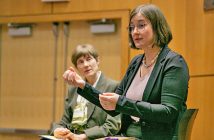
The Rev. Bryan Hehir delivered the lecture to a packed house. Photo by Tom Stoelker
The Rev. Bryan Hehir, Th.D., delivered the John Courtney Murray Lecture at the Lincoln Center campus on Monday, January 14. Father Hehir is the Parker Gilbert Montgomery Professor of the Practice of Religion and Public Life at Harvard Kennedy School, making him uniquely qualified to deliver a lecture whose namesake was known for parsing politics and religion.
John Courtney Murray, S.J., was an American theologian who delved into the sometimes-contentious relationship between democracy and religious freedom. During the Second Vatican Council, Father Murray played a critical role in establishing the “Declaration on Religious Liberty,” Dignitatis Humanae.
Father Hehir didn’t shy away from the political issues of our time, but rather than give his own take on the subjects, he attempted to analyze each through the prism of Murray’s writings, thus the talk’s title: “What John Courtney Father Murray Did Say, Did Not Say, and Might Have Said.”
In an outline-like format Father Hehir ‘s speech ticked off one issue after the next: The Church in the World, War and Peace, Abortion and the Civil Law, and Religious Freedom Today.
In addressing the Church and the World question, Father Hehir noted the discussion takes on three dimensions: The Church and State, which is a political/institutional question, the Church and Civil Society, which is a philosophical question, and The Church and the World, which is a biblical and theological question.
“John Courtney Murray dominated the first topic, Church and State, here and abroad,” said Father Hehir. “He towered above all of those around him.”
Father Hehir recast the Vatican Council into its contemporary setting, reminding listeners that just eleven days into the council the Cuban Missile Crisis began. The Cold War overshadowed proceedings.
“It was the two, the few, and the many,” said Father Hehir, as a way of describing the United States and the U.S.S.R., NATO, and the rest of the world. “Today we live in a less dangerous world in some ways, but its more complicated. And now we hear about the ‘rise of the rest.'”
He noted the significance of Iran, Brazil, and Nigeria, to say nothing of China. Financial interdependence has changed the nature of relations between nations. And the rise of “transnational non-state actors capable of acting like states” stands in stark contrast to the world of the early 1960s.
“The rise of Islam is a significant factor that must be managed as carefully as the rise of China,” he said.
Drawing from Murray’s writings on the Vatican II document Gaudium et Spes (“The Church and the Modern World”), Father Hehir said Father Murray clearly mapped out how the church should relate to the political order: protect human dignity, promote human rights, cultivate unity of the human family, and understand meaning in all areas of human activity.
“Father Murray argued that was the way the church should enter and relate to the political and remain a public church, but not a political church,” said Father Hehir.
He noted that the church sometimes holds positions that are almost sectarian in nature. While most large parts of the society seem to understand the church’s position on economic justice or war and peace, it’s harder to find common ground when the church delves into the world of bioethics.
In most of the contemporary issues facing the church and the world, Father Hehir was able to cite Murray’s work directly. Issues like the call for a just war were problems that Father Murray dealt with head on.
“Father Murray felt the tension of legitimizing force,” said Father Hehir.
He noted that even though Pope John Paul II abhorred violence, saying that “violence is evil” during the first Iraq war, even he found cause for force during the carnage at Srebrenica. Father Murray argued that absolute pacifism was primarily a teaching of some Protestant sects.
But in matters of how far the church should influence civil law, or for that matter, how far that law should interfere with church affairs, Father Hehir took a more interpretive approach to Murray’s writings. Unlike the just use of force, Father Murray did not write directly about bioethics, so Father Hehir referred to Murray’s writings on jurisprudence as “the relationship between moral and legal thought.”
“The moral order is always broader than the civil order,” Father Hehir said, referring to Murray’s writings. “The moral law covers everything in human behavior, thoughts, words, deeds… Civil law is more limited, limited to those issues that impact the public good of society. [Murray] wanted to distinguish the moral from the legal, but he never wanted to divorce them.”
The question, then, is under what conditions should moral order be translated into civil law? The issue, Father Murray wrote, depends on two distinctions: the distinction between private morality and public morality and the distinction between public morality and public order.
Private morality is to be left to the conscience of citizens. Public morality includes moral choices that substantially impact the public good. Public order was a category in the Council’s “The Declaration of Religious Liberty.” The category allows the state to set limits on expression that constitutes a threat to justice, public peace, or public morality.
“You should not try to encompass in the civil law everything that is wrong, because that turns the state into a totalitarian influence,” said Father Hehir.
Despite the fact that Father Murray argued that not all moral wrongs are the province of the public order, his definition of justice in the Declaration argues against expressions that violate the justice of others. Father Hehir speculates that Father Murray would certainly support the church’s moral argument against abortion. Regarding the legal order, Father Murray further speculates that it would hinge on question of justice in public order.
“You have to make a presumption that a developing fetal life should be protected from conception,” he said. “The taking of fetal life is at the center of public order.”
Father Hehir seemed well aware of the political realities of overturning Roe v. Wade, and said that setting limits to abortion could run concurrent to that effort, but that the church should tread carefully.
“We have to watch what kind of limits we set so that we are seen to be protecting life and not being vindictive to women,” he said.
In the case of the Affordable Care Act, church, state, and bioethics converge in what Hehir sees as a threat to religious freedom. While the church supports universal healthcare for all, it opposes a government mandate that requires some Catholic charities to cover the cost birth control for their employees.
The Health and Human Services Mandate (HHS) of the act allows religious organizations an exemption if they cannot carry out aspects of the law, such as providing contraception. But Father Hehir said the exemption definition is too narrow. Such “case specific” issues should not be blown out of proportion, he said. To avoid a “head on collision” with the federal government Hehir suggested that a broader exemption status should include all Catholic institutions.
The John Courtney Father Murray Lecture was reestablished by America Press to commemorate the 50th Anniversary of the Second Vatican Council. The lecture can be heard in its entirety here>


